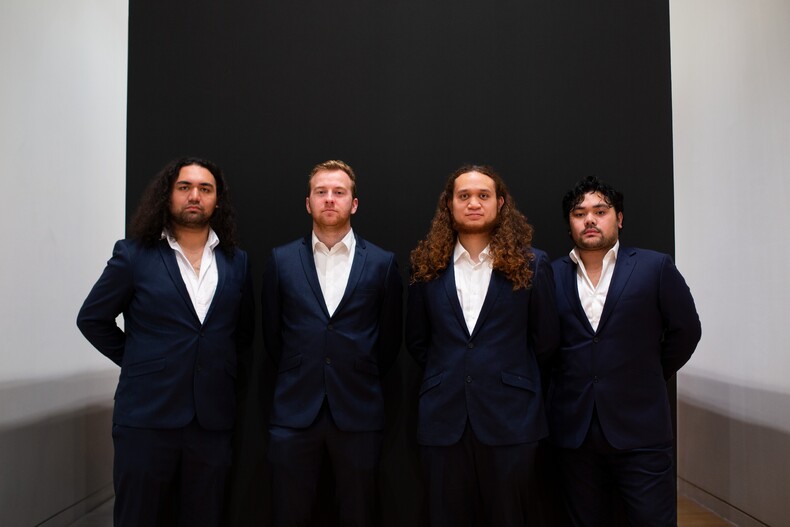Tokowhā (2022)
Presenting a sparkling programme of arias from classic opera, operetta and music theatre, alongside beautiful waiata and pese, Tokowhā features the vocal talents of four young singers who first met as students at The New Zealand School of Music. The members of Tokowhā have already featured as guest soloists with ensembles throughout New Zealand including the New Zealand Symphony Orchestra and the New Zealand Secondary Students Choir, as well as performing in recent productions of La Traviata, Marriage of Figaro and Acis and Galatea.Tokowha Concert Review
View Programme Notes
Performance for Āti Awa Toa FM (Part 1)
Performance for Āti Awa Toa FM (Part 2)
In association with Chamber Music New Zealand
Sponsored by Bayleys
Review of Tokowhā:
Concert Review – Tauranga Musica
Tokowhā – Saturday, 9th April, 2022 at Baycourt’s Addison Theatre
Tauranga Musica, in partnership with Chamber Music New Zealand, presented a wonderfully entertaining afternoon of vocal music spanning opera, musical theatre, waiata, and pese featuring the quartet, Tokowhā. Tokowhā is comprised of Lila Junior (L. J.) Crichton (tenor), Matt Barris (baritone/tenor), Tomairangi Henare (baritone), Morgan-Andrew King (bass), and is ably supported by accompanist, Alex Jefferies.
The concert began with the opening scene from Puccini’s La Bohème, which conveniently and ingeniously introduced each singer, one at a time. Crichton immediately impressed with his beautifully soft and light lyric sound, demonstrating considerable control and command of his instrument. He would go on to sing Rodolfo’s famous aria, Che gelinda manina, with great sensitivity and an excellent understanding of the nuances of the Puccini style and sound; notwithstanding a valiant attempt at the high C which has undone many a fine tenor. Bass, King, also made an immediate and lasting first impression in this opening scene with his commanding vocal presence and exquisitely rich bass tone.
Baritone, Henare, went on to deliver Questo amor, vergogna mia, from Puccini’s lesser-known opera, Edgar. Obviously a demanding aria, the baritone gave a determined effort and is to be congratulated for his perseverance despite one or two unreliable moments.
To bring a close to the Puccini portion of the programme, the quartet came together to present their own touching arrangement of the aptly-named and seemingly-appropriate, Sogno d’or. The inspired, yet subtle accompaniment on guitar lent itself well to the blend of the four voices and added a refreshingly original dimension to this gentle lullaby.
The rest of the concert’s first half was dedicated to waiata and pese – honouring the singer’s roots and communities in which they grew up and in which perhaps their first musical seeds were sown and nurtured. Crichton, of Samoan background, both opened and beautifully led, Moe I Le Po Masina. He was supported delicately by the other three with moving and inspired sensitivity. Clearly a recognisable melody and audience favourite, their rendition of Hine E Hine was both touching and warmly received. The quartet concluded with a powerful and confronting call for all iwi and peoples to come together in Te Iwi E.
Tokowhā’s second half of their programme began much like the first, featuring several operatic selections. A clever arrangement of the Humming Chorus from Madama Butterfly, saw each singer make his way back onto the stage; after which Henare delivered Dr. Maletesta’s aria, Bella siccome un angelo from Donizetti’s Don Pasquale. An ambitious selection for a developing baritone, Henare sang with commitment and conviction, even attempting a rather demanding cadenza at the aria’s conclusion.
Then followed selections from light opera, namely Gilbert and Sullivan, as well as songs from My Fair Lady and Showboat. Crichton’s Oh, Is There Not One Maiden Breast from Pirates of Penzance, although a touch on the fast side, was sung with intense affection and envious control, providing a perfect contrast to Henare’s wonderfully enthusiastic, For I Am a Pirate King. Barris’ On the Street Where You Live was delivered with excellent creativity and drama. Visibly and vocally, musical theatre is universe in which Barris is both comfortable and convincing as a performer. King’s Ol’ Man River not only spanned the breadth and width of his phenomenally rich and impressive bass range, but also provided a moving end to the lighter section of this concert’s second half.
A Pasifika medley, arranged by Tokowhā themselves, featured a carefully curated and contrasting selection of songs from Tahitian, Samoan, Fijian, and Tongan traditions. A real highlight of the afternoon, these songs are not only representative of the communities which have supported, sustained, and encouraged these young, emerging singers; but they are also a marvellous celebration and poignant reminder of what it is to be a part of Aotearoa’s rich musical whānau.
To conclude, Tokowhā presented another of their own arrangements. Parlami d’amore Mariù is a love song by the 20th century Italian composer, Cesare Bixio. This apropos finale brought this programme to a rather satisfying end and once more provided an opportunity to showcase the promising vocal talents of Crichton and King in particular. This reviewer would be entirely remiss, however, if attention were not drawn at least once to the fantastically sensitive and unfailing support of pianist, Alex Jefferies, who tirelessly worked from the piano to support Tokowhā with considerable panache and aplomb.
Chalium Poppy
Previous concert
Next concert
